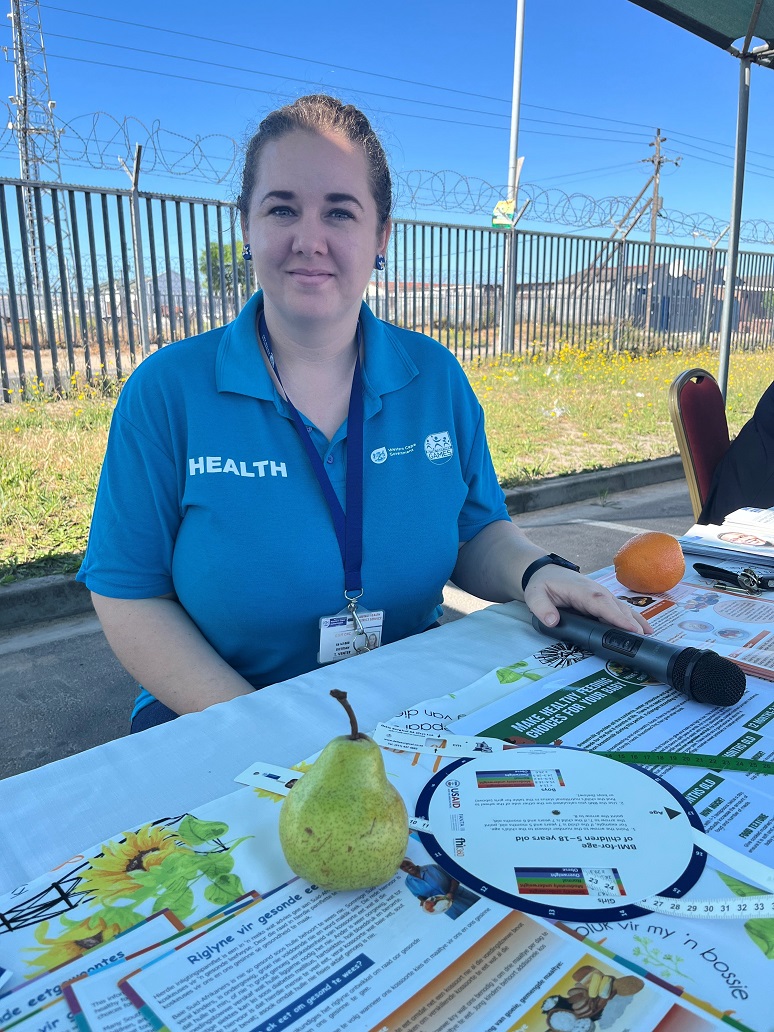
News
Living with diabetes - How to take charge of your health
Whether you’re caring for someone living with diabetes or have diabetes, it’s important to understand the chronic illness and how to manage it to avoid complications. While receiving a diabetes diagnosis can be overwhelming, the good news is that help is available and you can take charge of your health.
Ahead of World Diabetes Day on 14 November and National Diabetes Week from 14 – 19 November, Dr Muideen Bello and dietician Tanja Venter have teamed up to raise awareness on diabetes.
According to the International Diabetes Federation, approximately 537 million adults (20-79 years) are living with diabetes.
In the last 12 months, clinics in the Western Cape have cared for approximately 184 451 people living with diabetes. Our records further indicate that at least 14 747 new residents started to receive care for diabetes in the last 12 month.
WHAT IS DIABETES?
The World Health Organisation defines diabetes as a chronic disease that occurs either when the pancreas does not produce enough insulin or when the body cannot effectively use the insulin it produces. Insulin is a hormone that regulates blood glucose. Hyperglycaemia, also called raised blood glucose or raised blood sugar, is a common effect of uncontrolled diabetes and over time leads to serious damage to many of the body's systems, especially the nerves and blood vessels.
Diabetes is a major cause of blindness, kidney failure, heart attacks, stroke and lower limb amputation. The good news is that diabetes can be treated, and its consequences avoided or delayed with a healthy diet, regular physical activity, maintaining a normal body weight, avoiding smoking, taking your medication and regular screening and treatment for complications.
THREE IMPORTANT STEPS TO MANAGE YOUR DIABETES
The theme for World Diabetes Day 2021-23 is access to diabetes care. In 2022, the world campaign focuses on the need for better access to quality diabetes education for healthcare professionals and people living with diabetes. Here are three ways you or your loved ones can better manage diabetes:
1. Build healthy habits
Receiving a diagnosis of diabetes can be overwhelming, but you’re not alone. Even though reducing your sugar intake is a key factor, it is important to also focus on living an overall healthy lifestyle, limiting the intake of foods high in salt and fat, smoke cessation and avoiding alcohol abuse.
These unhealthy habits can contribute to increased damage to small blood vessels leading to an increased chance of developing complications or other diseases of the lifestyle,” shares Tanja Venter, a dietician at Delft CHC.
Tanja says a healthy diet together with the appropriate use of medications and being physically active is the best way to control your diabetes.
One of the most important rules in eating healthily is to eat regular meals. Regular meals will contribute to less fluctuating blood glucose levels.
Tanja has shares healthy living tips below:
- Eat three balanced meals per day with healthy snacks in between (fruit with plain yoghurt or a slice of whole wheat bread). Include carbohydrates (starch) high in fiber like whole wheat bread, oats, barley, beans, and lentils. Reduce oil and fat intake.
- Choose healthier cooking methods like steaming.
- Try to cut off all visible fat from all meats before cooking and remove the skin from your chicken before cooking.
- Eat fruit and vegetables daily. Your vegetables should contribute to at least half of your plate/meal. Remember not to add unnecessary sugar, butter, sauces, or salt to your vegetables. Three fruits can be eaten daily but be mindful of the portion sizes.
- Be careful of consuming enormous amounts of sugar via drinks. Water is always the best drink option and should be increased to at least 8 glasses per day.
- Exercise 30-45min, 3-4 times per week (150min/week).
Tanya says it is important that a resident living with diabetes visit a dietitian often, especially when blood glucose levels are not controlled, for a more individualized diet plan. Visit your local clinic to get support from a dietician at no cost.
2. Take your medication regularly and as prescribed
A healthcare worker at your clinic can help you find medication that’s best for your individual needs. It is important to take your medication provided when you have diabetes.
Taking the medication as prescribed means making efforts to achieve treatment goals which includes the prevention of complications. It will help you to stay healthy. The medication available includes oral agents and injectables (insulin),” says Dr Muideen Bello, who works at the Elsies River Community Health Centre (CHC).
If you have any questions about your medication, you can speak to a pharmacist or a healthcare worker at your clinic. It is important to take you medication every day, even if you feel better.
3. Always attend your clinic appointments
Routine check-ups are important to help you manage your diabetes. Dr Bello explains: Diabetic patients should visit their local clinic or local doctor often and this depends on how well-control their blood sugar is. Diabetics with well-controlled blood sugar can visit their clinic or doctor twice a year or every six months. Those with poorly controlled blood sugar will need to visit their clinic or doctor more frequently depending on the attending clinician. Some may need to be seen monthly or every second month. People living with comorbidities, such as hypertension, may also have frequent visits depending on how controlled these comorbidities are.
Dr Bello encourages regular visits as advised by your local healthcare worker. If you have missed an appointment, it is important to make a new appointment as soon as possible to protect your health.
These visits are important to maintain your health and to ensure that your doctor can monitor your health. It can also help to prevent or manage further complications down the line.
WHAT ARE THE SYMPTOMS?
It's important to get your blood sugar tested at your clinic if you display any symptoms for diabetes. The World Health Organisation has shared the warning signs below:
Symptoms of type 1 diabetes include the need to urinate often, thirst, constant hunger, weight loss, vision changes and fatigue. These symptoms may occur suddenly.
Symptoms for type 2 diabetes are generally similar to those of type 1 diabetes but are often less marked. As a result, the disease may be diagnosed several years after onset, after complications have already arisen. For this reason, it is important to be aware of risk factors.
WHAT ARE THE BENEFITS OF MANAGING YOUR DIABETES?
There are many benefits of managing your diabetes and getting help at your local clinic. By managing your diabetes, you can reduce your chances of experiencing complications such as vision problems and other serious medical conditions. Managing your diabetes can help to improve the quality of your life and protect your health for yourself and your loved ones.
Our services include chronic support clubs and special support groups for people with chronic diseases. In this way, a patient can get more information on special care and health education about their condition to manage their wellness and live healthier and longer lives.
Good health allows you to do more of what you love every day. If you need support, visit your clinic to access free healthcare. Take charge of your diabetes today!





